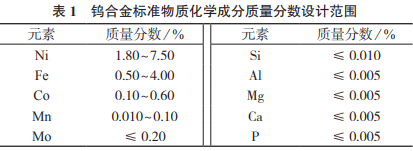钨合金具有高密度、特种高机械强度、钨合低热膨胀系数、金成抗腐蚀性和良好的分分机械加工等综合性能,在航空航天、析标军事装备、准物质研制电子、特种化工等许多领域中得到了广泛应用。钨合作为钨合金材料理化分析的金成实物标准,特种钨合金成分分析标准物质在产品质量检验、分分测量方法评价、析标统一测试量值方面发挥着重要作用。准物质研制国内外现有钨合金标准物质只有一套4种,特种含4种元素,钨合不能满足特种钨合金材料成分分析的金成需要,各科研、生产单位采用合成标准溶液进行入厂材料、出厂产品的理化分析检验和产品质量过程控制。由于合成标准溶液稳定性差、浓度误差大、操作时间长,难以保证分析数据的准确和可靠,为了解决特种钨合金材料成分量值溯源难题,确保该类钨合金材料化学分析结果准确一致,笔者研制了一套特种钨合金成分分析标准物质。本套标准物质的研制依据GB/T15000、JJF1006-1994和YB/T082-2016的要求进行。
为了能覆盖W273、W261、W263、W253、W252、W243.1、W243、W242A、W242、W232、W231、W221、GW-179钨合金材料的化学成分组成,采用全元素系统设计法,设计的各元素含量呈均匀梯度分布,合金元素含量总和基本保持一致。该系列标准物质的化学成分设计范围见表1。

为保证标准物质均匀性及成分含量准确度受控,原始材料全部采用高纯金属粉及粉状基准试剂,质量分数均大于99.9%(部分达99.995%),材料粒径均小于0.076mm(部分材料粒径小于0.054mm),原料不能满足要求时采用特制工艺研磨加工至所需粒度,以保证充分混匀。
所有原材料采用V型混合器加合金球球磨,以保证粒径小于0.076mm,控制装填系数和混合时间,使合金混合粉充分混合均匀。
采用500t高压机械压制方式,制成Φ25~32mm圆棒状样品。
采用氧化铝填料埋烧方式,使物料在烧结过程中受热更为均匀,从而避免材料出现过烧或欠烧的现象。烧结过程中采用惰性气体保护氛围,以免氧化和烧损,最佳烧结温度控制在1570~1650℃。
对烧结毛坯进行偏析检验,应没有明显偏析的材料,去掉毛坯烧结面残留,防止烧结时渗透污染,再精加工成合适粒度的样品,综合考虑样品熔融及粒度试验情况,选取粒径为0.16~0.9mm的样品为本批标准物质的材料。将选取的材料再次混匀,然后分装于玻璃瓶中,作为成分分析标准物质样品。编号分别为W-1~W-5。
对烧结后的毛坯逐个进行外观检验,没有起泡、疏松现象且金属性能良好的属于合格毛坯,未满足要求的应废弃。
每个项目随机抽取烧结好的毛坯试样5个,分别在每个试样对应端面的边部、心部取样作为偏析检验的样品(取样时应丢弃表面层3mm部分)。由同一个人在同一实验室,控制相同的实验条件,采用电感耦合等离子体原子发射光谱法进行检验,统计各个部位的检验结果,计算数据间的极差,若极差小于日常分析方法允许差,则认为该样品没有明显偏析。W-1样品偏析检验结果列于表2,分析结果表明,不同部位各成分含量无明显差异,满足标准物质的研制要求。

取少部分精加工成合适粒度的样品,筛分为0.45~0.9mm、0.28~0.45mm、0.18~0.28mm、0.16~0.18mm、<0.16mm5个粒径区间的样品,在相同条件下对各粒度区间的样品进行成分分析,以W-1样品为例,试验结果及加权平均值分别见表3、表4。


粒度试验结果表明,虽然不同粒度间Ni、Fe、Co、Mn、Mo等含量略有差异,但由于本标准样品总体粒度较小,即使在最小称量条件下,其粒度分布也与总体分布一致,且加权平均值与混合样品测得值无显著差异,因此不会影响成分分布的均匀性。考虑到粒径小于0.16mm样品的测定结果差异稍大,且较细粒度样品容易带来加工污染,故决定舍掉粒径小于0.16mm的样品,最终只取粒径在0.16~0.9mm区间的样品作为本批标准物质的成品。
按照JJF1006的抽样数要求,在所加工的每种标准物质的100瓶样品中,随机抽取20瓶试样进行均匀性检验,采用电感耦合等离子体原子发射光谱法对Fe、Co、Ni、Mn、Mo、Si、Mg、Al、Ca、P含量进行测定,最小称样量为0.1000g。每瓶试样在不同部位按照一定顺序测定3次,每种元素得到3×20个数据,将测定结果用单因素方差分析法统计检验,若统计值F小于临界值F0.05(19,40),说明样品成分是均匀的。查表可知,F0.05(19,40)=1.84,均匀性检验结果见表5。由表5可知,该套标准物质均匀性良好。
声明:本文所用图片、文字来源《化学分析计量》,版权归原作者所有。如涉及作品内容、版权等问题,请与本网联系
相关链接:钨合金,钨标准溶液,氯化钨